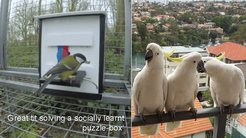Two PhD and one Postdoctoral position in the new research group studying the ecology and evolution of animal culture

We are seeking two PhD students to join an exciting new research group studying the ecology and evolution of animal culture (supervisor. Dr Lucy Aplin), based at the Max Planck Institute for Ornithology, in Radolfzell, Germany. The PhD positions are for 3.5 years fully funded, and open for applicants from any nationality.
Background
Traditional views of Darwinian evolution focus on selection acting on genetically underpinned variation as a means of adaptation. However this may neglect the potential contribution of the over-generation transmission of information (cultural inheritance) as a source of locally adaptive behaviour - this might be particularly important in long-lived species and when facing novel or changing environments. For example, the capacity for innovation, social learning and cultural inheritance is thought to be vitally important in the success of humans as a species, facilitating our colonization of almost every terrestrial habitat on Earth. But has the cultural transmission and inheritance of behaviour been similarly important in the success of some other species? We investigate these questions using a combination of laboratory experiments and field studies in birds, utilizing state-of-the-art automated tracking technologies and analytical techniques.
Project 1: "Laboratory Experiments of Cultural Evolution"
How are the emergence, establishment and persistence of cultural behaviours influenced by social and environmental conditions? Can culture evolve over time, and if so, is this process 'Darwinian'? We will test the link between cognition, social structure and emergent cultural phenomenon in large-scale laboratory experiments similar to 'experimental evolution' studies, with the longitudinal observation of groups of captive birds in a large aviary complex on site. The project will involve some local fieldwork with wild tits (Parus major), as well as captive work with small parrots.
Project 2: "Cultural Ecology in Urban Parrots"
Can social learning and the cultural inheritance of information be a source of behavioural flexibility to novel environments? This project will investigate this question in sulphur-crested cockatoos, Cacatua galerita. Sulphur-crested cockatoos have repeatedly colonized urban areas, both within their native range and as an invasive species. They are also highly social and relatively long-lived, with an extensive repertoire of vocalizations and foraging behaviours. In this project, our group will use a combination of citizen-science, GPS tracking technologies, field observations and experiments to a) describe the social ecology of this species, 2) test socio-cognitive mechanisms for urban adaptation, and 3) make within and between population comparisons in foraging and vocal behaviours to identify potential cases of 'wild cultures'. This project will involve fieldwork in Australia, and is co-supervised by Dr. John Martin at the Royal Botanic Gardens, Sydney, Australia, in collaboration with the Australian Museum.
Position Details
Suitable applicants should have a Masters Degree or 1st Class Honours Degree in Zoology, Ecology, or related subjects. Applicants with a background in computer science, physics, or engineering but who have demonstrated an interest in biology, are also encouraged to apply. Demonstrated experience of independent research is highly desirable. The working language in the group is English, and candidates should have proficiency in both written and spoken English. No German language skills are required. We are an inclusive and diverse group, and encourage applications from women, people with disabilities, and all under-represented minorities.
Location
The lab is based at the world-leading Max Planck for Ornithology (MPIO), in Radolfzell, Germany. It is planned that the students will join the International Max Planck Research School (IMPRS) for Organismal Biology - a cooperative doctoral program between the Max Planck Institute for Ornithology and the University of Konstanz. As part of their degree, IMPRS fellows can attend a range of optional modules, e.g. programming and writing courses, and participate in a curriculum that involves more than 30 leading researchers from across 4 MPIO departments and the Department of Biology at Uni. Konstanz. The official teaching language is English. More broadly, the Bodensee area is fantastic place to live, with numerous outdoor activities including hiking, cycling and sailing, and with easy access to Zurich. The Institute and University have extensive facilities and support for new and international students and their families.
Application Process
Interested applicants should send a cover letter detailing their research interests, a CV, and the name and contact details for at least one referee compiled in one PDF file to Dr. Lucy Aplin at laplin@orn.mpg.de. Applications will be received until 6 October 2017, with interviews conducted from October-November 2017. The students will ideally start in January 2018, however a flexible start date is possible if needed.
Keywords Darwinian evolution, cultural behaviour, cognition, social ecology, citizen-science, GPS, urban adaptation
Supervisor Lucy Aplin, Max Planck Institute for Ornithology Radolfzell
